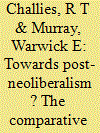|
|
|
Sort Order |
|
|
|
Items / Page
|
|
|
|
|
|
|
| Srl | Item |
| 1 |
ID:
083624


|
|
|
|
|
| Publication |
2008.
|
| Summary/Abstract |
Abstract: The Millennium Development Goals (MDGs) are a set of international development targets agreed to by members of the United Nations in 2000. The goals aim to improve many of the dimensions of extreme poverty and are to be achieved by 2015. This paper provides an overview of the issues relevant to the achievement of the MDGs in the Asia-Pacific region. The paper begins by discussing the critiques of the MDGs before assessing whether countries in the region are on track to achieve them. Issues relating to data availability and accuracy are discussed and the need to tailor the MDG targets to the special circumstances of some Asia-Pacific countries is examined. The paper proceeds by discussing the role of international assistance via international foreign development aid and non-governmental organisations in the achievement of the MDGs. The paper concludes with some policy implications for the international donor community.
|
|
|
|
|
|
|
|
|
|
|
|
|
|
|
|
| 2 |
ID:
084430


|
|
|
|
|
| Publication |
2008.
|
| Summary/Abstract |
Abstract: The Millennium Development Goals (MDGs) are a set of international development targets agreed to by members of the United Nations in 2000. The goals aim to improve many of the dimensions of extreme poverty and are to be achieved by 2015. This paper provides an overview of the issues relevant to the achievement of the MDGs in the Asia-Pacific region. The paper begins by discussing the critiques of the MDGs before assessing whether countries in the region are on track to achieve them. Issues relating to data availability and accuracy are discussed and the need to tailor the MDG targets to the special circumstances of some Asia-Pacific countries is examined. The paper proceeds by discussing the role of international assistance via international foreign development aid and non-governmental organisations in the achievement of the MDGs. The paper concludes with some policy implications for the international donor community
|
|
|
|
|
|
|
|
|
|
|
|
|
|
|
|
| 3 |
ID:
083623


|
|
|
|
|
| Publication |
2008.
|
| Summary/Abstract |
Abstract: Return migration has escaped significant analysis in the Pacific island region. Both migration from and return migration to the Tongan village of Nukunuku are for multiple reasons, with migration centred on employment and education, and return centred on the social context of home and duty. Return is limited, with intentions not being matched with practice, and the village and national population not growing. However, return migrants acquire skills, capital and experience overseas, which can be transferred into a Tongan cultural context, although identities have changed during migration. Return migrants typically take up employment or acquire businesses on return, gain some social status from the outcome, and are neither failures nor retirees. Nonetheless, return engenders expectations and tensions exist between returnees and more established residents, although ultimately, return migrants contribute to household, local and national development, as part of an unfinished process.
|
|
|
|
|
|
|
|
|
|
|
|
|
|
|
|
| 4 |
ID:
084427


|
|
|
|
|
| Publication |
2008.
|
| Summary/Abstract |
Abstract: Return migration has escaped significant analysis in the Pacific island region. Both migration from and return migration to the Tongan village of Nukunuku are for multiple reasons, with migration centred on employment and education, and return centred on the social context of home and duty. Return is limited, with intentions not being matched with practice, and the village and national population not growing. However, return migrants acquire skills, capital and experience overseas, which can be transferred into a Tongan cultural context, although identities have changed during migration. Return migrants typically take up employment or acquire businesses on return, gain some social status from the outcome, and are neither failures nor retirees. Nonetheless, return engenders expectations and tensions exist between returnees and more established residents, although ultimately, return migrants contribute to household, local and national development, as part of an unfinished process.
|
|
|
|
|
|
|
|
|
|
|
|
|
|
|
|
| 5 |
ID:
084424


|
|
|
|
|
| Publication |
2008.
|
| Summary/Abstract |
Abstract: In 2001, two indigenous Orang Asli communities living in Peninsula Malaysia were forced to leave their homelands to make way for the Sungai Selangor dam. The dam, built to resolve water shortages in Kuala Lumpur, came with a comprehensive compensation package designed to alleviate the hardships faced by the displaced communities. This paper explores the discursive and material impacts of these compensation packages. We argue that the emerging literature on compensation for displaced people values the same sorts of economic and social criteria as the Malaysian government does in its pursuit of modernising the Orang Asli. Their shared belief that effective compensation would improve the quality of life for affected communities above pre-displacement levels helped to publicly legitimise the dam-building project. Interviews with the displaced communities, however, found stark differences in community satisfaction which have more to do with losses of intrinsic place-based cultural and spiritual values, for which there may be no effective or adequate compensation, than social and economic criteria. We conclude that compensation programmes will always struggle to effectively cope with these less tangible place-based values and that open acknowledgement of this weakness is required if alternatives to displacement-inducing development projects are to be more readily considered.
|
|
|
|
|
|
|
|
|
|
|
|
|
|
|
|
| 6 |
ID:
083622


|
|
|
|
|
| Publication |
2008.
|
| Summary/Abstract |
Abstract: In 2001, two indigenous Orang Asli communities living in Peninsula Malaysia were forced to leave their homelands to make way for the Sungai Selangor dam. The dam, built to resolve water shortages in Kuala Lumpur, came with a comprehensive compensation package designed to alleviate the hardships faced by the displaced communities. This paper explores the discursive and material impacts of these compensation packages. We argue that the emerging literature on compensation for displaced people values the same sorts of economic and social criteria as the Malaysian government does in its pursuit of modernising the Orang Asli. Their shared belief that effective compensation would improve the quality of life for affected communities above pre-displacement levels helped to publicly legitimise the dam-building project. Interviews with the displaced communities, however, found stark differences in community satisfaction which have more to do with losses of intrinsic place-based cultural and spiritual values, for which there may be no effective or adequate compensation, than social and economic criteria. We conclude that compensation programmes will always struggle to effectively cope with these less tangible place-based values and that open acknowledgement of this weakness is required if alternatives to displacement-inducing development projects are to be more readily considered
|
|
|
|
|
|
|
|
|
|
|
|
|
|
|
|
| 7 |
ID:
084432


|
|
|
|
|
| Publication |
2008.
|
| Summary/Abstract |
Abstract: The Melanesian sub-region of the South Pacific, in particular, has been branded by some political analysts as an 'arc of instability' because of upheavals such as coups (Fiji), ethnic conflict (Solomon Islands), paramilitary revolts (Vanuatu), and secessionist rebellion and civil war (Bougainville-Papua New Guinea and the Southern Highlands). Simplistic notions and prejudices about the region pose challenges for journalists attempting to report with depth, context and analytical skill. Pressures and dilemmas for the news media continue to gain momentum in the South Pacific, often from a cultural as well as socio-political dimension. While the media in some countries is refreshingly outspoken and courageous, in others it has a trend towards self-censorship. This article critiques coverage in the region and some of the problems in an age of globalisation and preoccupation with security. It also sketches the challenges for media education designed to contest images of the region beyond 'coups, conflicts and contraband'.
|
|
|
|
|
|
|
|
|
|
|
|
|
|
|
|
| 8 |
ID:
084429


|
|
|
|
|
| Publication |
2008.
|
| Summary/Abstract |
Abstract: Pacific governments seeking to expand national economies are increasingly looking to tourism to provide revenues. At the same time, companies that operate cruise ships are searching for new destinations for increasing numbers of larger, faster ships which they are launching to cater for steadily increasing demand for cruises. The Pacific region appeals to both companies and passengers as a cruise destination. This coincidence would, at first glance, seem to provide an opportunity for a mutually beneficial relationship between companies and governments in the region. But little is presently available to those in the Pacific who must decide what role this form of tourism might play in their future. This paper reviews some of the environmental, economic and societal impacts of cruise ship tourism and concludes that, managed effectively, this form of tourism can yield higher returns with lower risks than some alternatives and could form a part of a sustainable tourism policy.
|
|
|
|
|
|
|
|
|
|
|
|
|
|
|
|
| 9 |
ID:
083621


|
|
|
|
|
| Publication |
2008.
|
| Summary/Abstract |
Abstract: Drawing on field work in Southern Thailand undertaken in July 2005, the study illuminates the complex and contingent way in which the Indian Ocean tsunami of December 2004 affected communities, households and individuals. The paper problematises the indiscriminate/discriminate patterning of impact and recovery and also makes a case for a delocalised and transnational approach to understanding the impacts of the wave. Using the notion of 'tsunami footprints' and drawing on qualitative interviews, the paper proposes that impacts need to be seen in the context of the spatially dispersed networks of association that characterise the Thai space economy and Thai society. Drawing on work on poverty dynamics, the paper also explores three explanatory disjunctures in recovery transitions: the disjuncture between the pre-tsunami context and the post-tsunami situation; the disjuncture between structure and agency; and the disjuncture between the appearance of progressive and gradual change in societies and the lived reality of turbulence
|
|
|
|
|
|
|
|
|
|
|
|
|
|
|
|
| 10 |
ID:
084422


|
|
|
|
|
| Publication |
2008.
|
| Summary/Abstract |
Abstract: Drawing on field work in Southern Thailand undertaken in July 2005, the study illuminates the complex and contingent way in which the Indian Ocean tsunami of December 2004 affected communities, households and individuals. The paper problematises the indiscriminate/discriminate patterning of impact and recovery and also makes a case for a delocalised and transnational approach to understanding the impacts of the wave. Using the notion of 'tsunami footprints' and drawing on qualitative interviews, the paper proposes that impacts need to be seen in the context of the spatially dispersed networks of association that characterise the Thai space economy and Thai society. Drawing on work on poverty dynamics, the paper also explores three explanatory disjunctures in recovery transitions: the disjuncture between the pre-tsunami context and the post-tsunami situation; the disjuncture between structure and agency; and the disjuncture between the appearance of progressive and gradual change in societies and the lived reality of turbulence.
|
|
|
|
|
|
|
|
|
|
|
|
|
|
|
|
| 11 |
ID:
084436


|
|
|
|
|
| Publication |
2008.
|
| Summary/Abstract |
Abstract: It is increasingly recognised that both formal and informal institutions could be important variables in explaining the diversity of capitalist systems. However, less is known about the relative importance of regional institutions for regional economic activity and regional development, especially in developing countries. This article analyses the relative importance of regional institutions to regional capitalist systems in Southeast Asia, using the comparative institutional approach of 'business systems'. Two comparisons are made that enable an analysis of the relative importance of regional institutions: one between two regional economies in the same country (Cebu and Negros Oriental in the Philippines) and one between two bordering regional economies in different countries (Satun in Thailand and Perlis in Malaysia). We investigate four sets of economic institutions: the extent of alliance coordination of supply and demand, the extent of collaboration between competitors, the extent of alliance coordination of sectors and access to finance. The results suggest that regional economic institutions are stronger in agricultural areas with relatively weak national economic institutions and that the presence of strong and enabling regional economic institutions is one of the factors that lead to taking advantage of favourable agricultural conditions, to economic growth and, ultimately, to catching up
|
|
|
|
|
|
|
|
|
|
|
|
|
|
|
|
| 12 |
ID:
084435


|
|
|
|
|
| Publication |
2008.
|
| Summary/Abstract |
Abstract: With the increase of global integration, the peri-urban area (PUA) of megacities in Asia has become a favourite destination for foreign direct investment (FDI). This paper uses the PUA of Shanghai as a case study to investigate the impact of global forces on the urban expansion of the city, and the link between urban growth and sustainable development in this mega-urban context. Shanghai has grown impressively during the past two decades in terms of economic and physical transformation. Much of this transformation has rested on the unbridled exploitation of land and other environmental resources in its peri-urban area. This is characterised by the designation of development zones and the concentration of manufacturing FDI, resulting in dispersed growth and environmental degradation. The disruption of the physical environment, combined with the concentration of the urban poor in these areas (in particular 'temporary migrants'), has turned the PUA into a potential crisis point threatening the social and economic development of the city.
|
|
|
|
|
|
|
|
|
|
|
|
|
|
|
|
| 13 |
ID:
084433


|
|
|
|
|
| Publication |
2008.
|
| Summary/Abstract |
Abstract: This paper compares the evolution of the dominant politico-economic paradigm over the past 80 years in two 'resource periphery' nation states that have become 'models' of economic reform, New Zealand and Chile. Analysing the forces that have driven change, it traces the shared transition from a neoclassical model, through structuralist/Keynesian principles, and on to neoliberalism. The paper discusses whether the contemporary convergence around neostructural policy represents a paradigm shift or an adaptation of the neoliberal model designed to sustain free-market principles in a form that is acceptable to electorates. The paper concludes that the broad commonalities in the transitions are remarkable and come about as a result of shared external shocks as well as similar historical insertions into the global political economy. Notwithstanding the parallels, the comparative approach reminds us of the contingent unfolding of economic paradigms across space, a point that counters arguments that assert that neoliberalism, and the globalisation to which it gives rise, create a homogenous global political economy. This comparative study is timely, as the two countries have recently signed a bilateral strategic trade partnership. This agreement indicates continued pursuit of neoliberal agendas in both countries rather than, as respective governments have heralded it, a move to foster South-South cooperation.
|
|
|
|
|
|
|
|
|
|
|
|
|
|
|
|
|
|
|
|
|